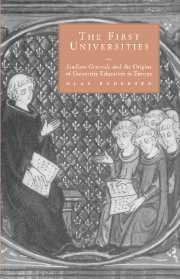Book contents
- Frontmatter
- Contents
- Preface
- Preface to the English edition
- List of abbreviations
- 1 The classical inheritance
- 2 From ancient science to monastic learning
- 3 The Carolingian Renaissance
- 4 The schools of the middle ages
- 5 From school to studium generale
- 6 The battle for the universities
- 7 Structure and form of government
- 8 The material situation
- 9 The road to degrees
- 10 Curricula and intellectual trends
- Index of names
8 - The material situation
Published online by Cambridge University Press: 03 November 2009
- Frontmatter
- Contents
- Preface
- Preface to the English edition
- List of abbreviations
- 1 The classical inheritance
- 2 From ancient science to monastic learning
- 3 The Carolingian Renaissance
- 4 The schools of the middle ages
- 5 From school to studium generale
- 6 The battle for the universities
- 7 Structure and form of government
- 8 The material situation
- 9 The road to degrees
- 10 Curricula and intellectual trends
- Index of names
Summary
In the picture of the birth and development of the universities so far, it might seem that we have lost sight of the students themselves. Thus in this chapter we shall look at the material conditions under which a student of the middle ages lived, to see what his chances were of commencing and completing a course of study, and how he might obtain its prerequisites: some preliminary education, money to live on, a place to live in and something to eat and drink, social security and legal protection and, last but not least, enough peace and quiet to study in. There is much reason to take these practical problems into account, as it was the medieval universities that by and large dealt with them, helping individual students to find a tolerable existence while they studied, by trying to keep necessary outlays down to a minimum. It is already clear that student universities such as Bologna worked for this purpose; it was as corporations of scholars to safeguard such common interests that these universities had been formed. And history shows that even professors's universities such as Oxford or Paris were not long in following this example, in providing extensive support in most of the above areas. Finally, this side of the story is also important simply because the efforts the universities made to solve these material problems often led to conflicts with the burghers of university towns; and this had repercussions on the university's relationship with medieval society in general.
- Type
- Chapter
- Information
- The First UniversitiesStudium Generale and the Origins of University Education in Europe, pp. 213 - 241Publisher: Cambridge University PressPrint publication year: 1998



